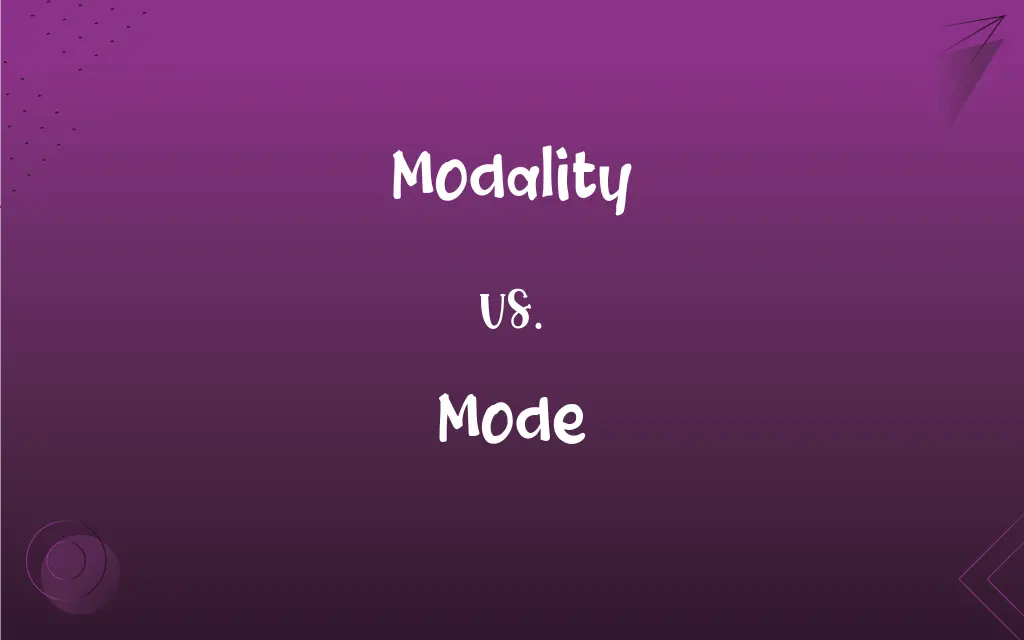Modality vs. Mode: What's the Difference?
By Harlon Moss & Janet White || Updated on May 23, 2024
Modality refers to the manner or degree to which something occurs, particularly in linguistics and logic, while mode refers to a specific manner, style, or method of doing something, often in various contexts like music, statistics, and general usage.

Key Differences
Modality is primarily used in contexts such as linguistics, logic, and philosophy to describe the manner or degree to which an action or state occurs. It includes concepts like necessity, possibility, and obligation. For example, in grammar, modality involves the use of modal verbs like "can," "must," and "should" to express likelihood, ability, permission, and obligation. Mode, on the other hand, is a broader term that refers to a specific manner, style, or method of doing something. It is used in various fields such as music, where it denotes scales or tonal structures, and in statistics, where it represents the most frequently occurring value in a data set. For example, in music, the Dorian mode is one of the scales used to compose melodies.
Modality often deals with the quality or state of actions or events, focusing on abstract and qualitative aspects. For instance, in logic, it involves the analysis of statements about necessity and possibility. In contrast, mode is more concrete, often referring to particular ways or methods in practical and artistic domains.
In linguistics, modality examines how different moods and modal verbs express attitudes towards actions or states. Mode in linguistics might refer to different methods of communication, such as spoken, written, or sign language.
While modality typically focuses on the potential, necessity, or manner of an action, mode emphasizes the specific style, method, or form it takes. For example, modality might explore how "should" expresses obligation, while mode could describe how a piece of music follows the Phrygian scale.
Modality can also refer to sensory modalities, which are different ways of experiencing the world through senses like sight, hearing, and touch. Mode, however, might be used in design to describe user interface modes, such as dark mode in software applications.
ADVERTISEMENT
Comparison Chart
Definition
Manner or degree to which something occurs
Specific manner, style, or method of doing something
Contexts
Linguistics, logic, philosophy
Music, statistics, general usage
Focus
Abstract and qualitative aspects
Concrete methods and forms
Linguistic Usage
Expressing necessity, possibility, obligation
Methods of communication
Musical Usage
Not commonly used
Scales or tonal structures
ADVERTISEMENT
Statistical Usage
Not applicable
Most frequently occurring value
Modality and Mode Definitions
Modality
The concept of possibility and necessity in philosophy.
Philosophers debate the modality of future events.
Mode
The most frequently occurring value in a data set.
In the data set, the mode is 7, as it appears most often.
Modality
The classification of propositions in terms of necessity, possibility, or contingency.
Modal logic studies different types of modality in statements.
Mode
A particular functioning arrangement or condition.
The software has a dark mode to reduce eye strain.
Modality
A particular mode in which something exists or is experienced.
Sensory modality refers to the different senses like sight and hearing.
Mode
A manner, way, or method of doing something, experiencing something, or acting
Modern modes of travel.
Modes of consciousness.
Modes of affection.
Modality
The fact, state, or quality of being modal.
Mode
A particular form or kind
The building has multiple modes of egress.
Modality
A tendency to conform to a general pattern or belong to a particular group or category.
Mode
A given condition of functioning; a status or operation
The spacecraft was in its recovery mode.
Modality
(Logic) The classification of propositions on the basis of whether they assert or deny the possibility, impossibility, contingency, or necessity of their content. Also called mode.
Mode
The current or customary fashion or style
A hat in the latest mode.
Modality
Modalities The ceremonial forms, protocols, or conditions that surround formal agreements or negotiations
"[He] grew so enthusiastic about our prospects that he began to speculate on the modalities of signing" (Henry A. Kissinger).
Mode
Any of certain fixed arrangements of the diatonic tones of an octave, as the major and minor scales of Western music.
Modality
(Medicine) A therapeutic method or agent, such as surgery, chemotherapy, or electrotherapy, that involves the physical treatment of a disorder.
Mode
A patterned arrangement, as the one characteristic of the music of classical Greece or the medieval Christian Church.
Modality
(Physiology) Any of the various types of sensation, such as vision or hearing.
Mode
(Philosophy) The particular appearance, form, or manner in which an underlying substance, or a permanent aspect or attribute of it, is manifested.
Modality
The fact of being modal.
Mode
See modality.
Modality
(logic) The classification of propositions on the basis on whether they claim possibility, impossibility, contingency or necessity; mode.
Mode
The arrangement or order of the propositions in a syllogism according to both quality and quantity.
Modality
(linguistics) The inflection of a verb that shows how its action is conceived by the speaker; mood
Mode
(Statistics) The value or item occurring most frequently in a series of observations or statistical data.
Modality
(medicine) A method of diagnosis or therapy.
Mode
(Mathematics) The number or range of numbers in a set that occurs the most frequently.
Modality
Any of the senses (such as sight or taste)
Mode
(Geology) The mineral composition of an igneous rock expressed in terms of percentage of the total sample weight or volume.
Modality
(semiotics) A particular way in which the information is to be encoded for presentation to humans, i.e. to the type of sign and to the status of reality ascribed to or claimed by a sign, text or genre.
Mode
(Physics) Any of numerous patterns of wave motion or vibration.
Modality
(theology) The organization and structure of the church, as distinct from sodality or parachurch organizations.
Mode
(Grammar) Mood.
Modality
(music) The subject concerning certain diatonic scales known as musical modes.
Mode
(music) One of several ancient Greek scales.
Modality
(sociology) The way in which infrastructure and knowledge of how to use it give rise to a meaningful pattern of interaction (a concept in Anthony Giddens's structuration theory).
Mode
(music) One of several common scales in modern Western music, one of which corresponds to the modern major scale and one to the natural minor scale.
Modality
(legal) The quality of being limited by a condition.
Mode
A particular means of accomplishing something.
What was the mode of entry?
Modality
The quality or state of being modal.
Mode
A particular state of being, or frame of mind.
After a series of early setbacks, her political campaign is in crisis mode.
Modality
A modal relation or quality; a mode or point of view under which an object presents itself to the mind. According to Kant, the quality of propositions, as assertory, problematical, or apodeictic.
Mode
(statistics) The most frequently occurring value in a distribution
Modality
A classification of propositions on the basis of whether they claim necessity or possibility or impossibility
Mode
A state of a system that is represented by an eigenfunction of that system.
Modality
Verb inflections that express how the action or state is conceived by the speaker
Mode
(computing) One of various related sets of rules for processing data; more generally, any state of the system associated with certain behaviours.
In insert mode, characters typed are directly inserted into the buffer.
Modality
A particular sense
Mode
(electronics) A series of settings on a device used for a specific purpose.
Airplane mode; night mode
Modality
A method of therapy that involves physical or electrical therapeutic treatment
Mode
(video games) A variation in gameplay, such as a difficulty level.
Modality
The use of modal verbs in grammar.
Modality is expressed using words like 'can,' 'must,' and 'should.'
Mode
(grammar) A verb form that depends on how its containing clause relates to the speaker’s or writer’s wish, intent, or assertion about reality.
Mode
(philosophy) That which exists only as a quality of substance.
Mode
(textiles) In lace-making, a small decorative piece inserted into a pattern.
Mode
(textiles) The openwork between the solid parts of a pattern.
Mode
(obsolete) A woman's mantle with a hood.
Mode
Style or fashion; popular trend.
Her wardrobe is always in mode.
Mode
Manner of doing or being; method; form; fashion; custom; way; style; as, the mode of speaking; the mode of dressing.
The duty of itself being resolved on, the mode of doing it may easily be found.
A table richly spread in regal mode.
Mode
Prevailing popular custom; fashion, especially in the phrase the mode.
The easy, apathetic graces of a man of the mode.
Mode
Variety; gradation; degree.
Mode
Any combination of qualities or relations, considered apart from the substance to which they belong, and treated as entities; more generally, condition, or state of being; manner or form of arrangement or manifestation; form, as opposed to matter.
Modes I call such complex ideas, which, however compounded, contain not in them the supposition of subsisting by themselves, but are considered as dependencies on, or affections of, substances.
Mode
The form in which the proposition connects the predicate and subject, whether by simple, contingent, or necessary assertion; the form of the syllogism, as determined by the quantity and quality of the constituent proposition; mood.
Mode
Same as Mood.
Mode
The scale as affected by the various positions in it of the minor intervals; as, the Dorian mode, the Ionic mode, etc., of ancient Greek music.
Mode
The value of the variable in a frequency distribution or probability distribution, at which the probability or frequency has a maximum. The maximum may be local or global. Distributions with only one such maximum are called unimodal; with two maxima, bimodal, and with more than two, multimodal.
Mode
How something is done or how it happens;
Her dignified manner
His rapid manner of talking
Their nomadic mode of existence
In the characteristic New York style
A lonely way of life
In an abrasive fashion
Mode
A particular functioning condition or arrangement;
Switched from keyboard to voice mode
Mode
A classification of propositions on the basis of whether they claim necessity or possibility or impossibility
Mode
Verb inflections that express how the action or state is conceived by the speaker
Mode
Any of various fixed orders of the various diatonic notes within an octave
Mode
The most frequent value of a random variable
Mode
A particular form or variety of something.
The Phrygian mode is used in many types of music.
Mode
A manner or way of doing something.
Switching the computer to sleep mode saves energy.
Mode
A specific method of expression or presentation.
He preferred the narrative mode of storytelling.
FAQs
How is mode used in music?
In music, mode refers to scales or tonal structures, such as the Dorian or Phrygian mode.
Is modality applicable in philosophy?
Yes, modality in philosophy deals with concepts of possibility, necessity, and contingency.
How does modality differ from mood in linguistics?
Modality expresses degrees of necessity and possibility, while mood indicates the form of a verb that expresses a grammatical function like indicative or subjunctive.
What is an example of modality in a sentence?
"You must finish your homework" uses modality to express obligation.
What is modality?
Modality refers to the manner or degree to which something occurs, especially in linguistics and logic.
How is modality used in linguistics?
Modality in linguistics involves the use of modal verbs to express necessity, possibility, and obligation.
Is modality used in medical contexts?
Yes, modality can refer to treatment methods or diagnostic procedures in medicine.
Can modality refer to sensory experiences?
Yes, sensory modality refers to different ways of experiencing the world through senses like sight and hearing.
What is mode?
Mode refers to a specific manner, style, or method of doing something, used in various contexts like music and statistics.
Does modality relate to time and aspect in grammar?
Indirectly, as modality focuses on necessity and possibility, whereas tense and aspect focus on time and completion.
Can mode describe behavior?
Yes, mode can describe a particular manner or style of behavior.
Can mode be used to describe genres?
Yes, mode can describe different genres or methods of artistic expression.
What does mode mean in statistics?
In statistics, mode is the most frequently occurring value in a data set.
Can mode refer to software settings?
Yes, mode can refer to different settings or configurations, like dark mode in software applications.
What is the difference between modality and tone?
Modality refers to the manner of expression regarding necessity and possibility, while tone refers to the attitude or emotional quality in communication.
Can mode and modality be used interchangeably?
No, they are distinct concepts with specific uses in different contexts.
What is an example of mode in a sentence?
"The software offers a dark mode to reduce eye strain."
Can mode be used in visual arts?
Yes, mode can describe the style or method of expression in visual arts.
Is modality concerned with potential outcomes?
Yes, modality often deals with potentiality, such as what could or should happen.
How does modality influence sentence structure?
Modality influences the use of modal verbs, which can change the meaning and emphasis of a sentence.
About Author
Written by
Harlon MossHarlon is a seasoned quality moderator and accomplished content writer for Difference Wiki. An alumnus of the prestigious University of California, he earned his degree in Computer Science. Leveraging his academic background, Harlon brings a meticulous and informed perspective to his work, ensuring content accuracy and excellence.
Co-written by
Janet WhiteJanet White has been an esteemed writer and blogger for Difference Wiki. Holding a Master's degree in Science and Medical Journalism from the prestigious Boston University, she has consistently demonstrated her expertise and passion for her field. When she's not immersed in her work, Janet relishes her time exercising, delving into a good book, and cherishing moments with friends and family.































































